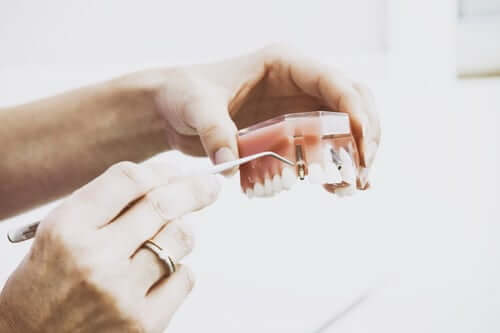
Whether you are missing teeth to periodontal disease, decay or an accident, we know that having a missing tooth can be uncomfortable and embarrassing. Luckily, there are several options for restoring your teeth. In this post, we will break down the differences between dentures and dental implants.
What Are Dentures?
A set of artificial teeth that fit over your gums (full dentures) or clip into place on existing teeth (partial dentures). You can get dentures for your top or bottom jaw. Dentures also have a gum-coloured acrylic base that can be matched to the colour of your gums for a natural look.
Pros of Dentures
- Less costly than implants, usually ranging from a few hundred to a few thousand dollars depending on the quality
- Relatively quick and painless process that does not involve surgery
- Covered by most dental insurance plans
- Restores a more youthful appearance by supporting your lips and cheeks and fixing the sunken look created by tooth loss
Cons of Dentures
- Bone loss over time causes dentures to stop fitting correctly eventually, so it will need to be adjusted or replaced
- Need to be removed to be cleaned thoroughly daily and to give your gums rest
- Can slip out of place, causing problems when speaking or eating
- Food can get caught under dentures creating discomfort and potential for infections
- Have to avoid eating many foods, which can lead to a less satisfying and nutritious diet
What Are Dental Implants?
An artificial tooth root made from titanium. The implant is then embedded into your bone of your jaw under your gums, where it acts as the base for the artificial tooth or crown. It is permanently fastened with dental cement. Dental implants have ridges that make them resemble screws. Once in place, dental implants are nearly identical to natural teeth and function just like them as well.
Pros of Dental Implants
- Allows the pressure from chewing and biting to be transferred to your bone, promoting bone growth. Bone loss occurs without this pressure
- Can eat virtually anything that someone with natural teeth can eat; no dietary restrictions
- Permanent and easy to clean with brushing and flossing, just like natural teeth
- Lasts a lifetime, which means less cost for maintenance
Cons of Dental Implants
- Priced at more than dentures, usually a few thousand for each
- Involve oral surgery
- Can involve several months of healing time before treatment is complete
- Sometimes considered a cosmetic procedure and not medically necessary by insurance companies, so some plans might not cover it
Like any dental procedure, your decision and the results you can expect will depend on your condition. When we recommend a treatment for replacing missing teeth, we take your current health, health history, budget, and ultimate goals into account. If you are interested in either dentures or dental implants, please arrange a consultation with Slipacoff Dental. We can answer any questions you may have and find a solution that works for you.
